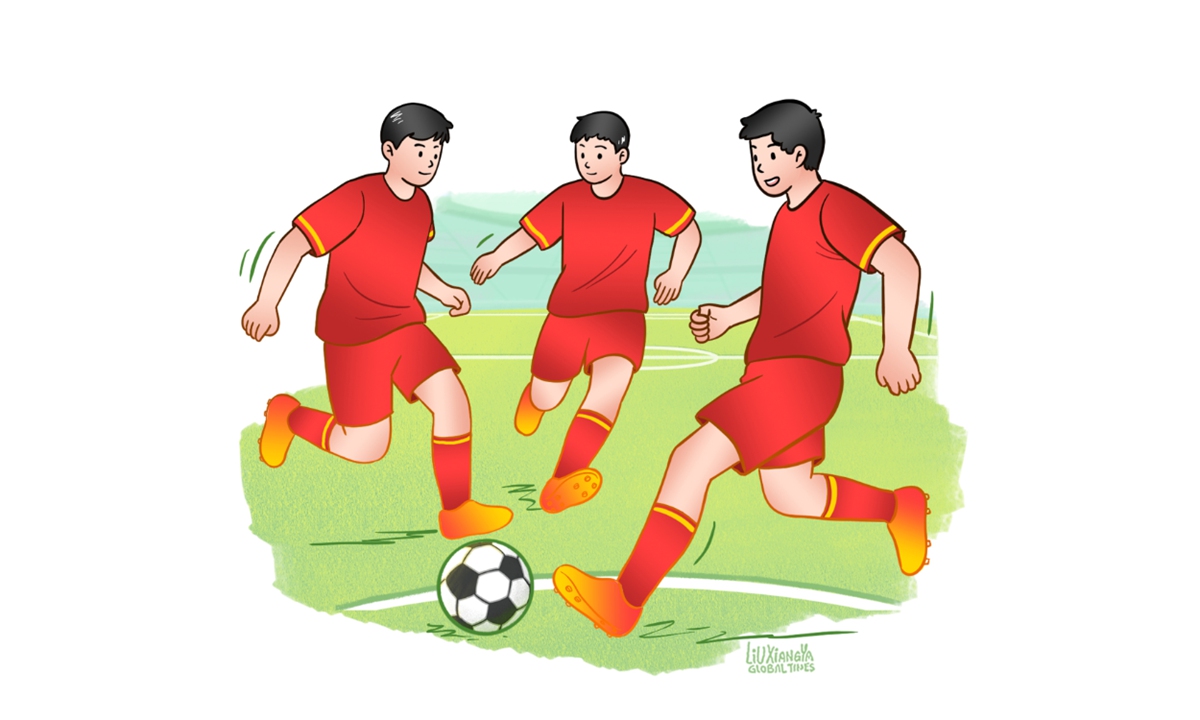
Illustration: Liu Xiangya/GT
The Chinese national under-17 football team concluded their U17 Asian Cup campaign on Wednesday night, with their hopes of qualifying for the U17 World Cup shattered after being unable to make it into the top two places in the group.
The disappointment is palpable. China has pinned its hopes on the current national U17 team qualifying for the U17 World Cup for the first time in 20 years.
The Chinese under-17 team had a high-profile training session overseas in 2024 with the German Bundesliga, a rare opportunity for young Chinese footballers. Thus, the failure to progress in the Asian Cup has inevitably led to some voices of doubt and frustration.
The expansion of the U17 World Cup, with the number of Asian qualifying berths doubling, has indeed increased the competition intensity. Every Asian team is now more motivated than ever to secure a place in the global showcase.
Football is a game of uncertainties. Even the most well-prepared teams can face unexpected setbacks.
China's neighbor Japan, whose football remains at the top in Asia, has a painful moment at the 2018 FIFA World Cup. Despite a spirited performance at the tournament, the Japanese team was eliminated in the round of 16 after a dramatic 14-second counterattack by Belgium, who overturned a 2-0 deficit to win 3-2.
This example vividly illustrates that in football, no matter how much effort is put in, the outcome is never guaranteed.
Notably, Japan's long-term investment in youth football has paid off in recent years. At the 2022 FIFA World Cup, their senior team stunned the world by defeating football powerhouses Germany and Spain in the group stage, showing what strengthening a youth pipeline built over decades could deliver.
Thus, the commitment to youth football development in China should not waver, especially considering that young players are showing signs of tactical improvements.
The emergence of outstanding players like Wang Yudong and Kuai Jiwen in the U20 team and Wei Xiangxin in the U17 team are seen as proof of this.
Although both the U17 and U20 national teams failed to qualify for their respective World Cups this year, it would be wrong to deny the progress they have made.
These young talents are a testament to the positive impact of the continuous investment in youth football.
Their skills and potential show that the youth development system in China is starting to bear fruit, and with more time and proper nurturing, they could become the backbone of the Chinese national team in the future.
One of the persistent challenges faced by Chinese youth national teams is the lack of sufficient high-quality international match experience.
The domestic league system, with its relatively slow pace and limited competitiveness in some cases, fails to provide young players with the exposure to the high-intensity, high-level football that is crucial for their growth.
Relying solely on major tournaments like the Asian Cup to gain international experience seems to be inadequate for young Chinese footballers.
This calls for more proactive efforts from the Chinese football authority. The CFA should increase exchanges with football associations in other parts of the world, actively seek opportunities for friendly matches, invitational tournaments, and youth exchange programs.
By contrast, Japan and South Korea's U17 and U20 teams often participate in international youth tournaments in Europe and South America, giving their players regular exposure to different styles and tactical systems.
Hosting more international competitions on home soil could also be an option, as this will not only give Chinese youth teams valuable playing experience but also attract international attention to Chinese youth football, potentially leading to more cooperation opportunities.
The setback of the U17 team's failure to qualify for the World Cup is a painful reminder of the long and arduous journey that Chinese football still has to take. However, this should not be seen as a reason to abandon the path of investing in youth football.
Instead, it should serve as a catalyst for more in-depth reflection and reform.
The author is a reporter with the Global Times. life@globaltimes.com.cn




